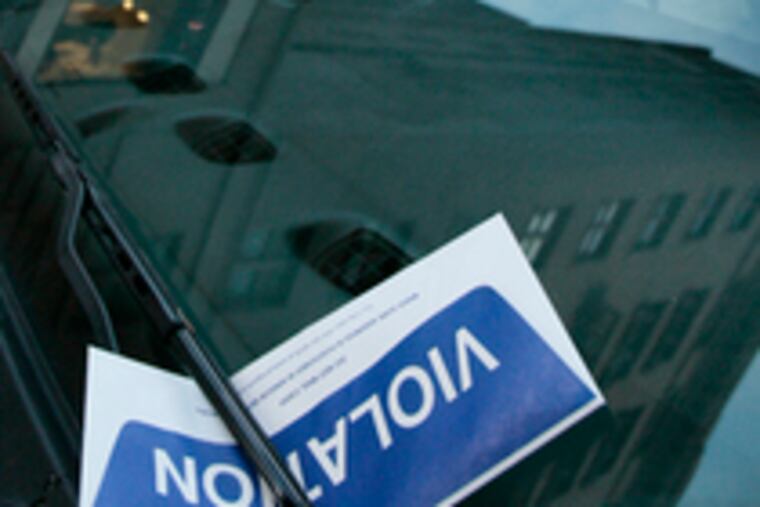No mercy shown for city shoppers
A kinder, more enlightened approach to parking is about to be tested in San Francisco. Philadelphia is not next. Here, not only does the battle for the curb space rage, but the ante has been upped.

A kinder, more enlightened approach to parking is about to be tested in San Francisco.
Philadelphia is not next.
Here, not only does the battle for the curb space rage, but the ante has been upped.
Along Walnut Street, for example, in one of the city's hottest commercial corridors, you have to move your car from metered spots before rush hour, ostensibly to clear the lanes for outgoing commuters.
There was never much leeway if you spent five minutes too long at Kiehl's testing hand cream. Since the Philadelphia Parking Authority has beefed up, however, providing so many patronage jobs that pad-wielding enforcement officers patrol every break-your-mother's-back seam in the sidewalk, enforcement has grown brutal.
Thus on Tuesday, at 3:31 p.m. - less than 60 seconds after the meter expired - Princessikea Thompson was nailed.
A half-hour earlier, Thompson, a 20-year-old Temple University student, had found a parking space between 16th and 17th. She scooped her Yorkshire terrier, Seven, under her arm, fed the meter, and dashed into Urban Outfitters.
With the feverish efficiency of one of those buy-all-you-can-in-under-15-minutes game-show winners, Thompson and a friend spent $90 on gifts, grabbed the bags and hauled . . . well, ran back quickly to the car. There, they found a Parking Authority agent writing a $41 ticket. "I'm here," Thompson said.
Without looking up, the agent continued copying the license plate number.
"I'll fight it," Thompson said calmly.
"Don't waste your time," the officer said. "We can write our first ticket at 3:31."
"How realistic is that?" Thompson asked. "I wasn't gone more than 15 minutes." The officer tore off the violation, slipped it into an envelope, and tried to hand it to Thompson, who was loading her shopping bags and the puppy, into the car. "I advise you to take this. It will be more expensive if they have to mail it to you," the agent said.
Thompson refused to accept it - on principle.
A half-block west, a woman was being ticketed minutes after putting on her emergency flashers and running into a bank to pay her rent.
It may seem as if the Parking Authority is doing right by the city, enforcing regulations to keep spaces turning over for retail shoppers and people who need to get in and out of offices on business.
But the agency's success - 1.6 million violations issued, 50,000 towed vehicles, and $192 million in revenue, very little of which is reinvested in city services - has generated enormous resentment.
"I have friends who refuse to shop in Center City because of the parking," said Sharon Gordon as she wedged a "broken meter" note into a jammed handle, hoping to escape a fine while she went to Daffy's to return a pair of shoes. "The Parking Authority is atrocious."
As she spoke, three drivers stopped to ask if she was leaving her parking spot. "If I were a vendor," Gordon said, "I'd be picketing City Hall."
For the last few years, national transportation experts have been talking about a radically different approach to metered parking. A free-market pricing policy that would ensure that 15 percent of curbside spots would be open at any time. A system that would put an end to the "gotcha" skirmishes that cost drivers a small fortune and the city so much good will.
The idea belongs to Donald Shoup, a professor of urban planning at the University of California, Los Angeles, and author of the 2005 book The High Cost of Free Parking. He proposes that cities dispense with time limits on meters and figure out how much to charge per hour so that 15 percent of spaces will always remain open.
The first benefit, he says, would be that drivers would no longer waste hours burning fuel and patience, searching for a parking spot. And the second? Cash, baby.
Market-driven rates could run $5 or more an hour, he says, significantly higher than the usual $1 in quarters.
Prices like that would surely enrage merchants and drivers.
"We used to have free parking on Sundays and Wednesdays after 5," said Al Grafstron, owner of La Fourno restaurant on South Street. "Now you have to feed the meters seven days a week until 10 p.m. How is that helping my business?"
In a Shoup-like parking universe, however, the pain of higher rates would be more than offset by the immediate, visible benefits: more available spaces, no time limits and tangible city services - weekly steam-cleaning of sidewalks, graffiti removal, increased police foot patrols, all paid for by parking fees.
"It's like putting a cash register on the curb," says Shoup. "You realize the meters are your friend."
In Philadelphia, a hint of how it could work may be found at 30th Street Station, where the 25-cent rate for 71/2 minutes ensures that there is almost always an open spot.
Next year, San Francisco is planning a pilot project to test a Shoup-like system.
"His theory is good," said Bond Yee, San Francisco's director of parking and traffic. "But you really have to balance it against other policy goals."
Revenues from parking and fines already go to public services, Yee says, especially public transportation: "We want to discourage people from driving downtown and parking for long periods of time."
Philadelphia, meanwhile, seems to be taking a retro approach. The Parking Authority's recent olive branch - free parking after 11 a.m. on Saturdays through Dec. 24 - is just the opposite of what the city should be doing, Shoup says.
"Just when parking is scarcest, you make it free? It's so backward," he says.
Could be. Still, for Princessikea Thompson and thousands of her fellow fallen, that kind of backward sure beats arrears.